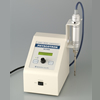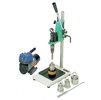Zeta Potential Analyzer: ZEECOM Features
TOP > Products > Zeta Potential Analyzer
1. Electrophoresis Migration
You can observe particle electrophoresis migration on the monitor on real-time basis.
2. Automatic Measurement
You can specify the number of particles to be measured and measuring time.
3. Measurement Time
The time needed for measurement on ZEECOM all depends upon samples. 5 seconds should be enough for one single particle measurement. The software can track up to 50 to 100 particles simultaneously. Therefore, if you would like to take the data of 100 particles, it will take about 5 to 10 seconds.
4. Individual Particles
Even when several kinds of particles are included in the sample, you can obtain the zeta potential of each type of particle. Software displays zeta potential distribution in histogram.
5. Aggregation, Settlement, and Rising of particles
In the zeta potential measurements, the particle movement in the X-axis direction (direction of electrodes) is analyzed.
On the other hand, in the aggregation, settlement, and rising measurements, the tracking direction of the particles is in the Y-axis direction. This can measure the settling speed of aggregates and coarse particles and rising speed of bubbles and hollow particles.
Major Differences between ZEECOM and existing ZP Instruments
1. Function to observe particle migration on monitor on real-time basis
Since data comes out of a black box on ZP units with Laser Doppler/PALS method, there is no way of telling if the obtained ZP data is dispersed or aggregated particles.
In ZEECOM, you can confirm which particles are being tracked and measured, and whether particles are steadily dispersed, aggregated, or settling down during measurement, by observing the measurement process on the monitor.
2. Automatic identification and tracking of moving particles
Microtec's proprietary image analysis software automatically identifies and tracks moving particles, obtains their migration speed and computes the zeta potential values, and then displays the ZP value of each measured particle on a PC monitor.
The easy-to-handle Teflon-made cell enables easy configuration for each measurement, as well as facilitating cleaning and maintenance.









